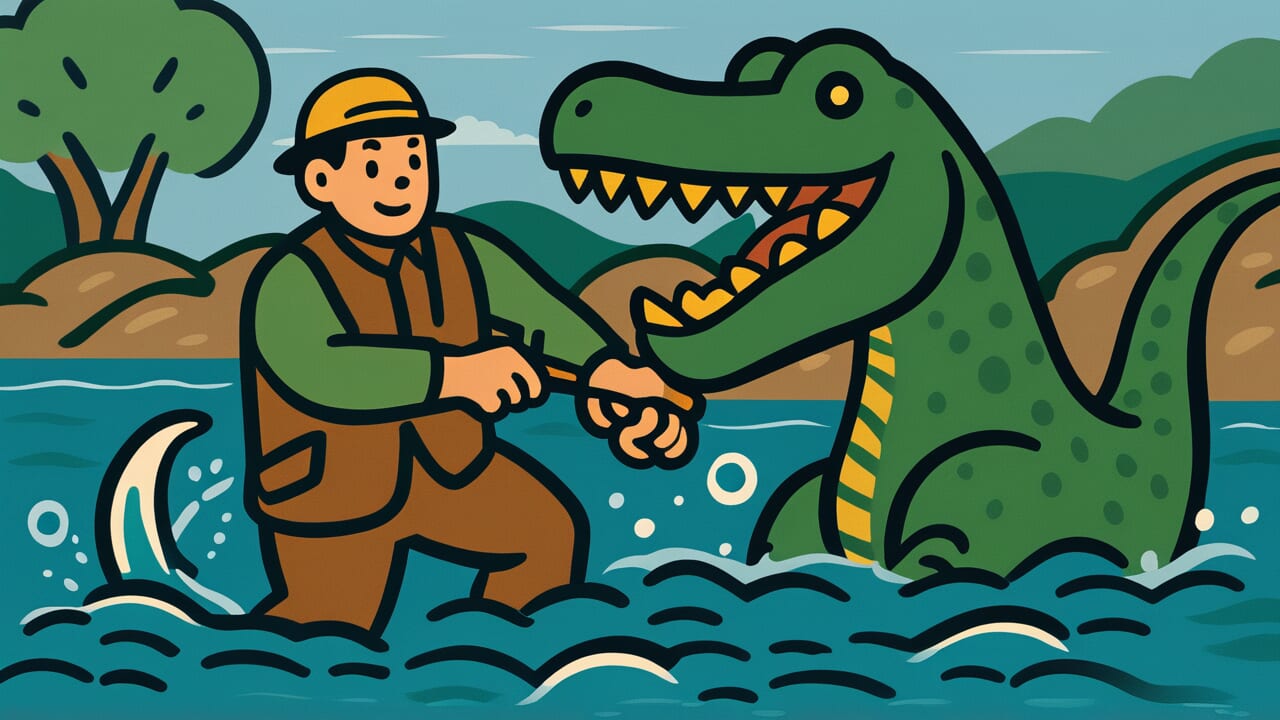How to Read “Not avoiding water dragons when traveling by water is the courage of a fisherman”
Mizu yukite kōryū wo sakezaru wa gyofu no yū nari
Meaning of “Not avoiding water dragons when traveling by water is the courage of a fisherman”
This proverb means that true courage is carrying out your duties without fearing danger.
Just as fishermen enter waters where fearsome dragons might lurk, it praises those who face danger knowingly to fulfill their responsibilities and mission.
People use this saying when praising someone who confronts difficult situations without running from their duties or responsibilities.
It doesn’t mean reckless or thoughtless behavior. It refers to the resolve to accept danger because you understand your role and want to fulfill it.
Even today, healthcare workers who continue working in infectious disease zones or firefighters who rush into burning buildings embody the courage this proverb describes.
Understanding your duty or mission deeply and not avoiding danger to fulfill it. That’s where true courage lies.
Origin and Etymology
This proverb is believed to come from Chinese classics.
“Kōryū” (water dragon) refers to an imaginary dragon living in water. People have feared it as a water deity since ancient times.
Fishermen had to work daily in waters where these fearsome dragons might be hiding.
Looking at the structure, “suikō shite” means traveling through water. “Kōryū wo sakezaru” means not avoiding dragons.
“Gyofu no yū nari” indicates this is the courage of fishermen. The meaning is clear: the fisherman’s attitude of entering water without avoiding dragons, even knowing they might be there, is true courage.
This expression likely emerged from the Confucian concept of “yū” (courage). Confucianism clearly distinguished between recklessness and true courage.
Fishermen don’t avoid water dragons because they’re foolhardy. They do it because it’s their job and necessary work to feed their families.
Understanding danger but moving forward for what must be done. This is the form of true courage that has been honored since ancient times.
Interesting Facts
In Chinese legend, a snake that lives five hundred years becomes a kōryū. After another thousand years, it becomes a dragon.
These creatures lurk in water and supposedly have power to cause floods. For ancient people, they symbolized water’s most terrifying aspect.
Fishermen did life-threatening work daily in waters where these legendary beings might hide.
The word “gyofu” (fisherman) in this proverb doesn’t just indicate an occupation. It also carries the meaning of a professional who takes pride in their work.
In Chinese classics, fishermen are often portrayed with respect. They face nature, know its harshness, yet possess the wisdom to survive.
Usage Examples
- Her going to the hospital during an infectious disease outbreak truly shows that not avoiding water dragons when traveling by water is the courage of a fisherman
- Heading to a rescue knowing the site is dangerous embodies the spirit of not avoiding water dragons when traveling by water is the courage of a fisherman
Universal Wisdom
This proverb has been passed down for so long because it vividly depicts one of humanity’s most difficult choices.
That choice is moving forward while knowing the danger.
Everyone feels fear. Wanting to avoid danger is a natural biological instinct.
But humans also have concepts of responsibility and mission. There are things we must do, roles we must fulfill.
Between these two forces, people have always struggled.
This proverb shows a deep understanding of humanity. True courage isn’t the absence of fear. It’s moving forward despite feeling fear.
Fishermen know how terrifying water dragons are. That’s exactly why their decision to enter the water has value.
Human society functions because such people exist. Someone must take on dangerous work and difficult roles.
Those who accept these roles aren’t fearless heroes. They’re ordinary people who fulfill their duties while knowing fear.
This proverb teaches us deep respect for such people and the essence of human dignity.
When AI Hears This
The brain’s amygdala sounds an alarm when it detects danger. But with repeated exposure to the same stimulus, the response weakens.
This is called habituation. When fishermen encounter dangerous aquatic creatures daily, the fear they initially felt fades.
The problem is that the danger itself hasn’t decreased, yet the brain decides “no need to warn anymore.”
Neuroscience research shows that expert brains have 30 to 50 percent lower responses to danger signals than novices.
This is a side effect of efficiency. The brain automatically lowers sensitivity because constantly being terrified would be mentally unsustainable.
Veteran climbers can walk calmly along cliffs that would make beginners tremble because of this mechanism.
What’s interesting is that this habituation creates distortions in probability calculations. Fishermen feel the next trip will be safe because “I’ve been safe a thousand times before.”
But in statistics, past safety doesn’t make the next accident probability zero. The danger on the thousandth and thousand-first trip remains the same.
The brain mistakes “familiarity” for “proof of safety,” but the dragon is there every day.
The fact that 70 percent of modern workplace accidents involve veterans with over ten years of experience proves this proverb’s correctness with numbers.
Lessons for Today
What this proverb teaches you today is the nobility of fulfilling responsibility.
We carry various responsibilities daily, large and small. Our roles at work, obligations to family, duties as members of society.
Sometimes fulfilling these responsibilities feels scary.
What’s important is that feeling fear isn’t shameful. Rather, you feel fear precisely because you correctly recognize danger and difficulty.
And then, understanding your role and trying to fulfill it despite that fear is true strength.
Modern society often considers avoiding risk to be wise. But if you avoid all risks, you can’t accomplish anything.
There must be work only you can do, roles you must fulfill. Discerning what those are and taking a step forward despite difficulties.
That courage enriches your own life and gives hope to those around you.
Moving forward while feeling fear. That might be the most beautiful form a person can take.



Comments